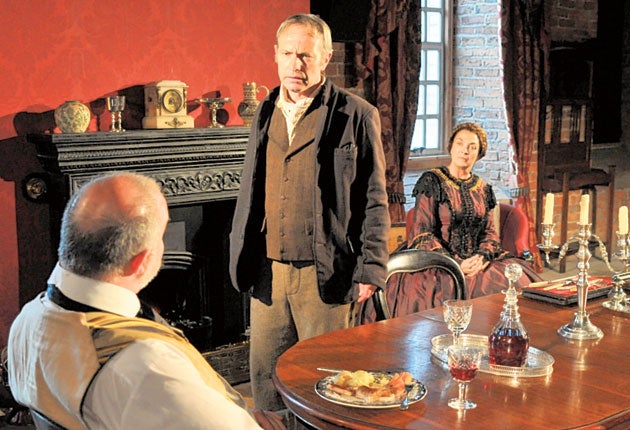Hard Times, Library Theatre, Manchester

To get to the performance of Hard Times you have to traverse a long brick gallery in Murray’s Mills in Ancoats on the Victorian industrial area of Manchester. This was a working mill from 1798 until the late 1950s and a textile temple of the rapacious capitalism which is the subject of Dickens’ scathing satire. In it you now pass a tableau of everyday 1850s life.
In the workers’ tenement hovels an invalid turns her head from a bowl of thin gruel. A drunkard collapses on a mattress. An elderly couple carefully divide a tiny meal of bread and cheese. A stooped woman gestures to a carpenter the smallness of the coffin she requires. There is a terrifying screech of machinery, and an even more terrible scream, before a bloodied woman is hurried through the audience on a stretcher.
Dickens tells the story of life in a blackened little cotton town where the Victorian philosophy of utility has set the minds of the dysfunctional Gradgrind family as hard as the sclerotic lungs of the town’s workers. There are two big problems with this grim little novel. The first is that the working people who ought to be its protagonists are sketched as barely as a backcloth. The second is that its main characters are largely grotesque ciphers in a bald allegory of the conflict between utilitarian pragmatism and the human spirit.
This makes for splendid melodrama. And the Library Theatre company’s cast of 11 tackle those with great relish, from Richard Heap’s blustering millowner Josiah Bounderby to Lynda Rooke’s humbled high-born Mrs Sparist. Roberta Kerr is a fluttering moth as Mrs Grandgrind. And Arthur Wilson is a creature of mesmeric calculation as the odious clerk Bitzer.
But this dramatisation by Charles Way improves on Dickens’ caricatures. Just as the opening tableau makes the ordinary people real, Way gives real depth to characters who are only selfless simperers in the book. He replaces Dickens’ sentimentality with warmth and his censoriousness with moral indignation. He is abetted by several performances of impressive depth.
One of Dickens’ most famous lines is when the invalid Mrs Gradgrind says “I think there’s a pain somewhere in the room, but I couldn’t positively say that I have got it”. The same could be said of the sense of frustration which seethes suppressed around the Gradgrinds’ daughter, Louisa, played by Alice O’Connell with an extraordinary controlled intensity. And the kindness of the circus girl Sissy Jupe, of whom Dickens requires little more than love and loyalty, becomes a strength rather than a weakness in Verity May Henry’s assured performance.
The pivotal character, the weaver Stephen Blackpool, is just a vapid victim in the novel. But here he is charged with a simple knowing dignity by David Crellin, one of those masterly actor who draws the eye even when he is saying nothing. Mina Anwar turns his girlfriend Rachel from the mere personification of moral purity into a conflicted flesh-and-blood woman.
Director Chris Honer’s promenade production is no gimmick. Rather it sweeps its audience, literally and emotionally, along the 75 metre mill-floor from scene to scene: schoolroom to bank, mansion to hovel, union meeting to circus. If you occasionally miss a line of dialogue as you move the urgency of the drama well compensates. Judith Croft has designed spare and atmospheric sets and Colin Sell provides unobtrusive evocative music.
To 2 July (0843 208 0500)
Subscribe to Independent Premium to bookmark this article
Want to bookmark your favourite articles and stories to read or reference later? Start your Independent Premium subscription today.

Join our commenting forum
Join thought-provoking conversations, follow other Independent readers and see their replies